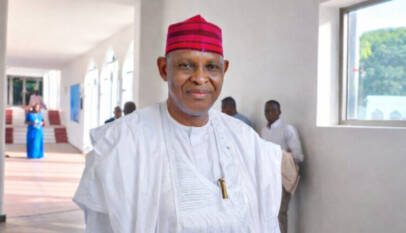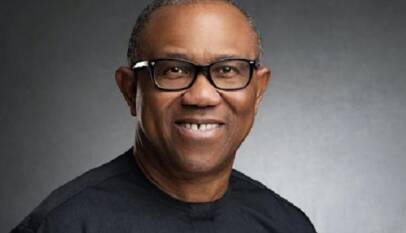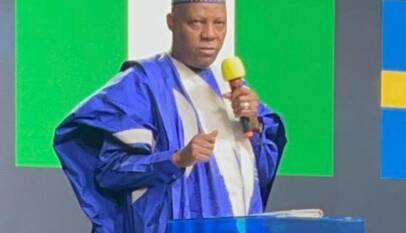Obaseki and Shaibu when the going was good
By Gabriel Efe
Politics is as much a dance of collaboration as it is of survival. In Edo State, the intricate steps of this political choreography have left a trail of fractures, intrigue, and unresolved tensions between former Governor Godwin Obaseki and his erstwhile deputy, Philip Shaibu. Now, as Edo transitions to a new administration, it is worth reflecting on the imbroglio that defined their once chummy relationship and exploring what it means for their political relevance, both locally and nationally.
A Tumultuous Partnership

Photo: Obaseki and Shaibu sparring before the fight
Governor Godwin Obaseki and Philip Shaibu were once a formidable duo, forged by the influence of former Governor Adams Oshiomhole, who chose the former, ‘out of nowhere’ as his successor in 2016, and picked the latter, his senatorial brother, as his running mate. Ironically, they coalesced into a partnership that defeated their godfather in the 2020 Edo governorship elections. However, like many political alliances forged out of convenience and ulterior motives, their union unravelled – spectacularly.
The cracks became visible shortly after the electoral victory that ushered in Obaseki’s second term. Shaibu, in preparation for his future, began positioning himself for the 2024 gubernatorial elections. The deputy’s ambitions clashed with Obaseki’s broader plans for succession, creating a power tussle that quickly spiralled into public bickering, administrative tensions, and political brinkmanship.
Obaseki, not one who harbours disloyalty, swiftly moved to strip Shaibu of the perks and privileges of his office and then moved to remove him entirely. That set the stage for the deputy’s spirited legal manoeuvres to prevent his removal, Obaseki’s counter-accusations of betrayal, and the eventual stripping of Shaibu’s powers and then impeachment revealed a government in turmoil. The spectacle was a cautionary tale of unbridled ambition and a reflection of the fragility of political alliances built on convenience rather than shared vision.
Where Are They Now?
Philip Shaibu: The Survivor
Shaibu has emerged from the conflict bruised but unbroken. His tenure as deputy governor may have ended under a cloud, but he retains his political clout in Edo’s northern senatorial district, where his grassroots connections remain strong. He also enjoys the proverbial last laugh, after joining forces with his estranged godfather, Adams Oshiomhole and the All Progressive Congress, APC, to wrest power from Obaseki’s PDP in the state.
Nationally, however, Shaibu’s standing is more precarious. His fallout with Obaseki likely diminished his appeal within the PDP, a party already grappling with internal divisions. If Shaibu harbours ambitions for future leadership in Edo, he will need to rebuild bridges within the PDP or explore alliances with rival platforms – a risky but not impossible endeavour in Nigeria’s fluid political landscape.
Godwin Obaseki: The Technocrat Who’s Lost His Mojo
Obaseki’s tenure ended on an anticlimactic note. Once seen as the force that killed and buried godfatherism in the state, his effort to resurrect the dragon by imposing Mr Asue Ogie on the state has not only exposed him but detracted from his personality. His supporters would argue that the technocratic approach to governance delivered notable infrastructural and institutional reforms. Conversely, his opponents believe he only pushed for often-toothed achievements that were elitist with no local or grassroots influence or benefits. His endless bickering with the traditional institution, political missteps and litany of alleged betrayals have made him more of a political leper both within Edo and on the national stage.
The outcome of the highly acrimonious elections that ushered in a successor from a rival party has also dealt a significant blow to his political influence, while his fallout with those who had helped him in critical times made it difficult for him to get restitution. His chosen candidate’s defeat underscored the erosion of his control over Edo’s political machinery.
Obaseki’s relevance is now further diminished as the new administration, backed by a legion of his political adversaries, seeks to consolidate power, distance itself from his legacy, and even extract their pounds of flesh. Nationally, his position within the PDP is precarious, with limited leverage, not just because of his failure to secure his party’s hold on Edo, but the needless wars that he waged against national figures, including the Minister of FCT, Nyesom Wike, who was instrumental to his second term election victory in 2024.
For Obaseki to remain relevant, he will need to craft a new narrative – perhaps positioning himself as a policy expert or statesman – though rebuilding political alliances in such a divided landscape will be an uphill battle.
Implications for Edo and Beyond
The fallout between Obaseki and Shaibu has left Edo in a state of political flux. The new administration must navigate these lingering tensions while forging its path. Key questions arise: Will the new government leverage the lessons from the Obaseki-Shaibu saga to foster unity and stability? How will the Obaseki-Shaibu rivalry shape future electoral dynamics in Edo?
At the national level, their story underscores the challenges of aligning state politics with broader party interests. For the PDP, it is a reminder of the need for stronger mechanisms to mediate internal disputes and manage succession plans.
A Lesson in Leadership and Loyalty
The Obaseki-Shaibu saga is more than a tale of political fallout; it is a case study in leadership, loyalty, and the dangers of unresolved ambition. As Edo State enters a new chapter, the lessons of the past must inform the future. Both Obaseki and Shaibu may still have roles to play in shaping Edo’s destiny, but their relevance hinges on their ability to transcend personal grudges and focus on the greater good.
For now, the story remains unfinished. Time, as always, will be the ultimate arbiter of their legacies.



























